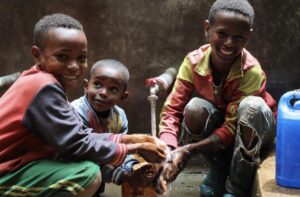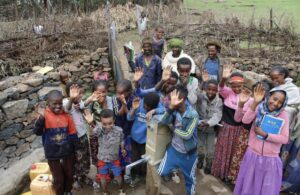‘Kids Can Be Kids’
High in the Ghana mountains, 9,000 feet to be exact, and down a small hill, over a spring and through the trees, children in the Sidama region visit their village’s new well to gather clean water. As we visited and spoke with one of the village elders, more children arrived with yellow jerry cans and used plastic water bottles.
As we observed and learned about the impacts of the well on the village, some of the children were fixated on the foreigners and the language they did not understand. Others traded whispers and giggles while waiting to see what we would do next.
Some were barefoot, familiar with the rugged terrain of the forested mountains.
When the young girls and boys didn’t think anyone was paying attention, I would point my camera lens in their direction. They would laugh and cover their faces after seeing their photo. Some smiled for the camera; some didn’t.
The real magic happened when they filled their water jugs, washed their hands, and cleaned their faces. Smiles almost as wide as Ethiopia itself. Glowing faces captured the image of generational healing and health.
As they carried the water back up the small hill to their homes, they stayed closely knit with our group, happy to make new friends.
I noticed two little boys staring as we walked, and I sent them a little wink to let them know they had been caught. They chuckled and stayed two steps behind. Turning around again, I made a scrunched-up face, and the group of about 15 children howled.
Next, a bubble face and the joyous sound of laughter filled the air once more. Spinning around again, they scrambled away, laughing and screaming as I pretended to chase them.
Trading secrets, made-up games, laughter, and running around barefoot. These are all things that many recall from childhood, but not something that all have the privilege to experience.
Because when there is clean water, kids can be kids.
They can laugh, play and fetch water when thirsty or need to cool off.
 When there is clean water, kids can go to school instead of spending the day walking miles to an unclean water source. They are given the opportunity to dream big and think for themselves.
When there is clean water, kids can go to school instead of spending the day walking miles to an unclean water source. They are given the opportunity to dream big and think for themselves.
With clean water near their homes, young girls don’t have to worry about being abducted and forced to marry just because they go to gather an essential element of life.
With clean water, more children gain the knowledge of proper sanitation and stay alive with a life absent of water-related diseases.
Because with clean water, new generations can have an opportunity to create cultural change and be who they want to be.

-Molly St. Clair